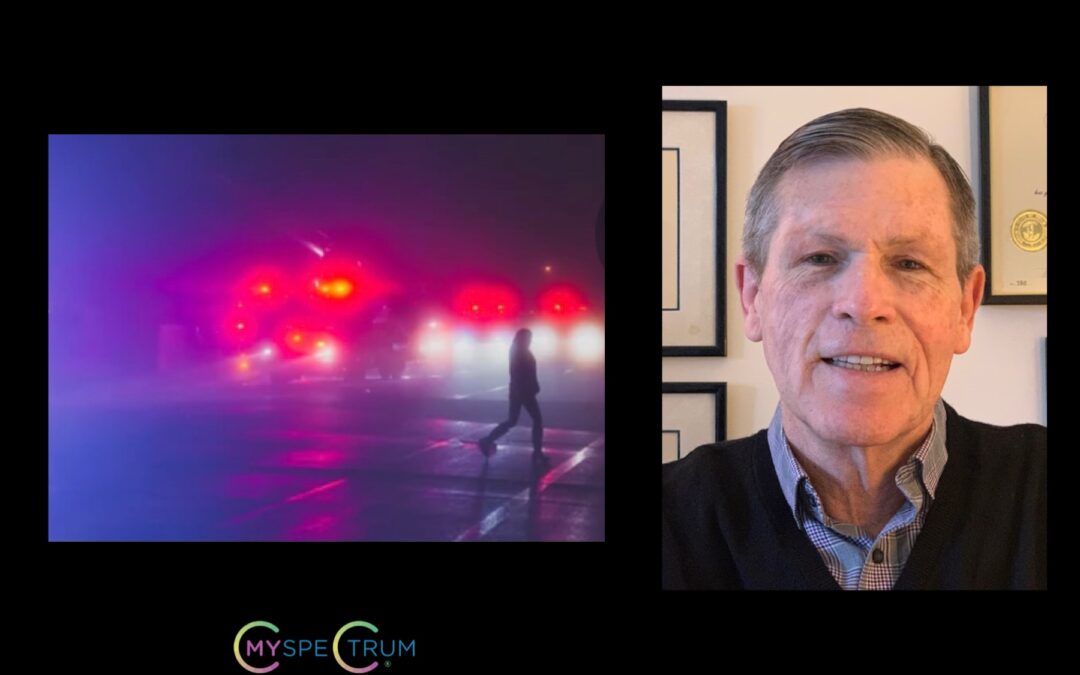George D. DeShazor Jr. MSW, ACSW, LCSW, DCSW, TIRF is a Teletherapist at MySpectrum Counseling & Coaching. Here, George offers insights into the importance of seeking mental health care for Law Enforcement & First Responders, based on George’s career experience of working within law enforcement, including the FBI. To find George’s bio, visit our MyTeam page.
In the late 1980’s I volunteered to work with first responders in Virginia as a member of a newly formed Critical Incident Stress Debriefing Team (CISD) sponsored by Emergency Medical Services. This team was comprised mental health providers, peer counselors and clergy to provide critical incident stress management to police, firefighters and other first responders in Hampton Roads. I learned from these heroes about the dangers they face on a daily basis.
Some of the dangers these employees and volunteers experienced throughout their career were shootings, employee deaths, suicides, natural or catastrophic events, domestic violence, sexual assaults and death of children. Other dangers were the hidden ones which affect thoughts, feelings and emotions.
This experience profoundly impacted me and I continued to provide these services on a volunteer basis for several years. It wasn’t long before I discovered and pursued my passion and vocation in law enforcement as a Federal Agent in the Department of Justice (DOJ).
What I experienced is that this job is stressful and can be dangerous physically, emotionally and mentally. It can be a culture of toxicity if left unchecked. Equally troubling are unwanted thoughts, images, and negative behaviors that continue to pile up each and every day. Each of us have internal and external stressors that can be exacerbated with prolonged exposure. Working out, running, lifting weights and others forms of exercise may temporarily de-stress but do not address the issue.
Warning Signs: Some first responders know something is wrong, but not sure what to do about it? Some believe it is normal and comes with the job. What would people think of me if I participated in therapy? What would I think of myself?
Stress Marriage /Relationships problems
Anger Financial difficulties
Depression Family dysfunction
Arrogance Excessive work hours
Morbid humor PTSD
Excessive Use of Substances Loneliness
Isolation Chaos/Losing control
Unable to turn it off Suicidal/Intrusive thoughts
All of these behaviors or stressors in combination can override normal coping mechanisms and normal physiological functions of our bodies.
CRITICAL INCIDENT STRESS DEBRIEFINGS (CISD):
As a clinician and FBI Agent, (SWAT team, Crisis negotiator, EAP Program manager and Behavioral Science Unit), I have been debriefed many times after exposure to shooting incidents, homicides, viewing disturbing videotapes/photographs, deployments and natural or catastrophic events. Sometimes debriefing the debriefers is a critical and important follow-up. Critical Incident Debriefings are sometimes the first responder’s therapeutic introduction to taking care of themselves and others. Debriefings are adaptive short -term helping process that focus on an immediate and identifiable problem. Debriefings are therapeutic but not therapy. The participants are not required to share feelings. Critical Incident Debriefings have proved extremely successful on identifying and describing concerning behaviors that may be acute or delayed. Since no one is ever forced to participate, debriefings are great source of information on coping, stress and anxiety. Stress can be good or bad, hurtful or helpful. Critical Incident Stress Management (CISM) was never created to treat trauma.
Falsehoods and Facts about Therapy
- Many COPS, firefighters, EMT’s, Dispatch 911 workers, and health care professionals often delay or avoid any aspects of seeking professional help for a number of reasons. They may believe that asking for assistance is a sign of weakness. Others may hear/believe their co-workers would be critical of them as they don’t possess what it takes to do the job well. Many first responders say they are fine, if asked by a spouse or colleague. Many are not.
- Some law enforcement members do not believe in the therapeutic experience despite never been involved. They are afraid they will be seen as weak, ineffective or not up to the job. Some workers believe that what they are go through won’t be understood by others. Time alone will not always alleviate problems.
- Some do not trust clinicians and believe there is no confidentiality. If the employee talks about a troubling incident, it maybe to their friends of colleagues where there is no confidentiality or knowledge of how to assist you with these issues. Still others may talk to peer counselors who can be very effective but are unlicensed and are not bound by state laws regarding confidentiality either.
- Another incorrect assumption/belief is that counseling is the same as fit for duty evaluations. It is not!
- Seeking voluntary therapy or counseling will hurt your career? This is simply not true. Some employees have been mandated for evaluation and have refused to attend have often experiences consequences for inaction, not for counseling.
- Some fear of being labeled with a stigma of mental illness. I often heard colleagues say “suck it up, because it’s part of the job, the job you chose and trained for. People who seek counseling are weak.” This is false – it takes bravery, commitment, and strength to improve your life.
What to do: Do your homework!
- Do some research into your departments policies on counseling and employee assistance. Progressive Police Departments and Agencies have a team of EAP professionals in house or contracted clinicians to work with their employees. Many departments have police chaplains to assist who are an integral part of the law enforcement team. Does your agency?
- I’ve seen command personnel mandate a “debriefing” after each incident (CISD) to all employees as a group after a critical event. Some commanders or management staff require their squads to attend the debriefing and participation is optional. These are meetings are educational.
- Some departments have mandatory annual mental health check-ups that are protected under law and notes are not taken during the interview. Many successful therapists trained to work with first responders are not speaking psychobabble, but speak your language and assist the officer in teaching them the tools to de-stress and learn healthy ways to cope.
- Keep an open mind. Law enforcement debriefs routinely after tactical situations, why not debrief after a stressful or dangerous event?
- Other first responders have chosen not use agency designated therapist or EAP counselors for different reasons and sought counseling on their own. There are many different views as to whether to seek counseling in your own agency or to go outside to an independent clinician. Explore these options and decide what is best for you. Some have chosen to pay cash as opposed to using their own insurance for fear of documentation within their department.
- Seek counseling for yourself. It is hard work but you are worth it. I know many of you are thinking about seeking help, pick up the phone and call a therapist that specializes in working with first responders who know your culture! You can learn new tools to bounce back and be resilient. Save a life!
If you would like to schedule a Teletherapy appointment with George at MySpectrum, please give us a call at 804-924-2236, or fill out the Get Started Form here.

